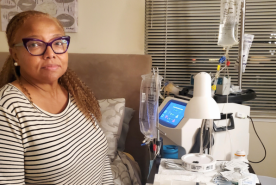September 07, 2023
Learn about kidney function, read patient experiences, and find resources for a fulfilling life on dialysis.
Facing kidney failure can be overwhelming, but with dialysis, many people continue to live full, meaningful lives. Read on to learn about different dialysis modalities, hear how people have adjusted to life on dialysis, and find helpful resources.
What Is Dialysis?
The kidneys have incredibly important jobs, including;
- Removing wastes and extra fluid
- Controlling the production of red blood cells
- Helping regulate blood pressure
- Controlling the amount of nutrients, like calcium and potassium, in the blood
When you have end-stage kidney disease (ESKD), your kidneys can no longer perform these jobs. As a result, you may experience nausea, swelling, and fatigue.
Dialysis takes over the work of filtering your blood and balancing fluids and nutrients. The average life expectancy on dialysis is 5–10 years, but many people live 20 or even 30 years with proper care.
“Dialysis is a process that removes toxins and fluid from your body when the kidneys can’t,” said William Henderson, Vice President of Renal Care. “The machine acts like a kidney and typically runs for about four hours, three times a week.”
Types of Dialysis
There are two types of dialysis:
1. Hemodialysis
Hemodialysis uses a machine and a special filter (dialyzer) to clean the blood. Blood flows from your body into the machine and back again. Treatments can be done in a dialysis center or at home.
2. Peritoneal dialysis
Peritoneal dialysis (PD) uses a cleaning fluid, dialysate, that is pushed into and out of the stomach lining, which acts as a filter. PD is done daily by the patient wherever they feel comfortable doing it.
“Dialysis machines can be intimidating,” said Belina Bimbo, dialysis facility manager. “Our job is to help patients feel comfortable and understand what’s happening. The more education they have, the more confident they become.”
Take our quick quiz to learn if home dialysis is right for you.
Subscribe today!
Join the NKF Blog Newsletter
Get inspirational stories and kidney disease resources delivered to your inbox every month. You'll gain practical insights and expert advice to help you better understand and manage your kidney health no matter where you are on your kidney journey.
Life on Dialysis: Real People, Real Experiences
Life on dialysis is undeniably different, but it doesn't have to be the end.
“Starting dialysis does not mean the end of life,” said social worker Ebony McKinley. “One of my patients thought he had to stop working, but once he realized he felt fine, he went back to his job full-time. Dialysis shouldn’t stop you from living.”
That couldn't be truer for Reginald Gramling, 63. He adjusted his schedule so dialysis wouldn’t interfere with his passion for sports.
“Life is still good, even though I’m on dialysis! I switched my treatment time to 6 a.m. so I could keep refereeing high school basketball games.”
Diet and energy levels can be challenging at first, but support is available.
“The two main causes of kidney failure are uncontrolled high blood pressure and diabetes,” said Girly Banzuela, RN. “We help and encourage patients to follow a low-salt, low-sugar diet and limit fluids if they’re on hemodialysis.”
“Dialysis can be tough, but I’ve built a second family here,” said Cassandra Watkins, a dialysis patient. “It’s not easy, but the machine is saving my life.”
Looking for ways to pass the time on dialysis? Here are eight activities to try during your dialysis sessions.
Dialysis Resources and Support
Living well while on dialysis can be challenging, but you don't have to do it alone.
Five helpful resources for living well on dialysis:
- NKF Peers: Connect with a mentor who has lived well while on dialysis.
- Dialysis Community: Join this safe and supportive space where you can share your experiences, ask questions, and get answers from other people doing dialysis.
- Medicare Guide: Get a breakdown of Medicare programs for dialysis patients.
- Dialysis-friendly recipes: Struggling to stick to your dialysis diet? Try these tasty dialysis-friendly meals and snacks.
- Kidney Learning Center: Find free online courses about kidney transplants and living kidney donations.
If you need services not listed here or transportation to dialysis treatments, speak with your dialysis care team. They are there to help. You can also contact NKF Cares to receive help from trained professionals.
*This content is provided for informational use only and is not intended as medical advice or as a substitute for the medical advice of a healthcare professional.









